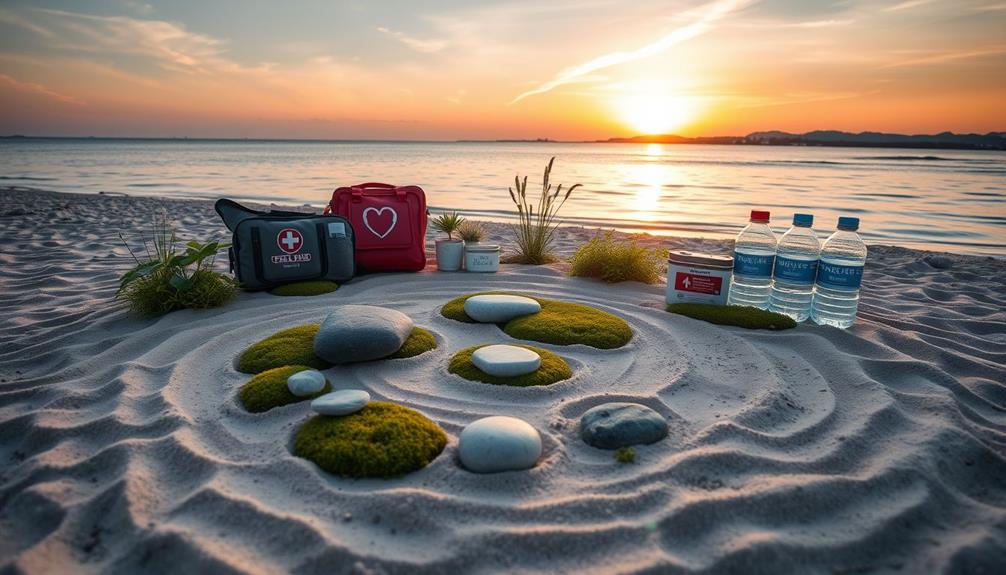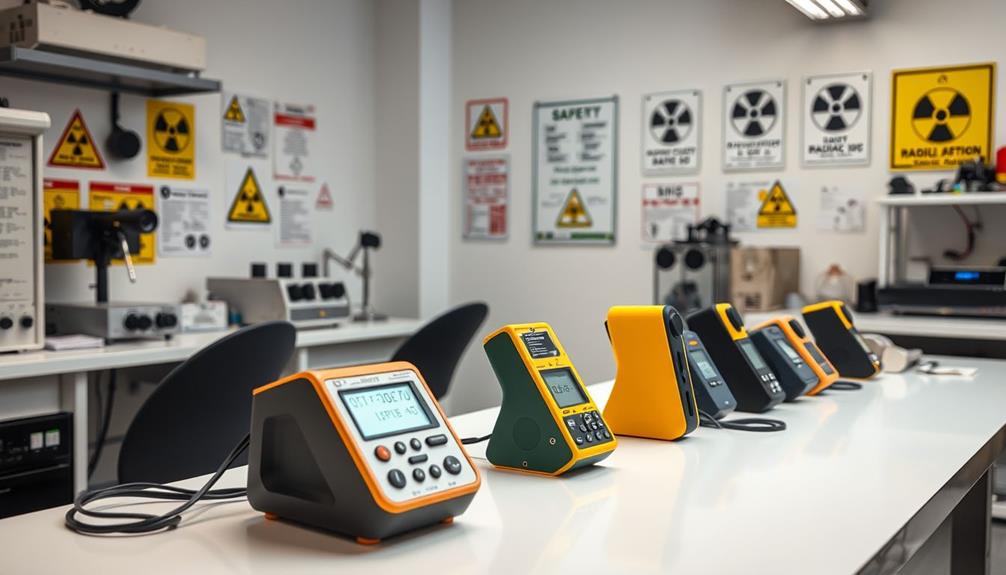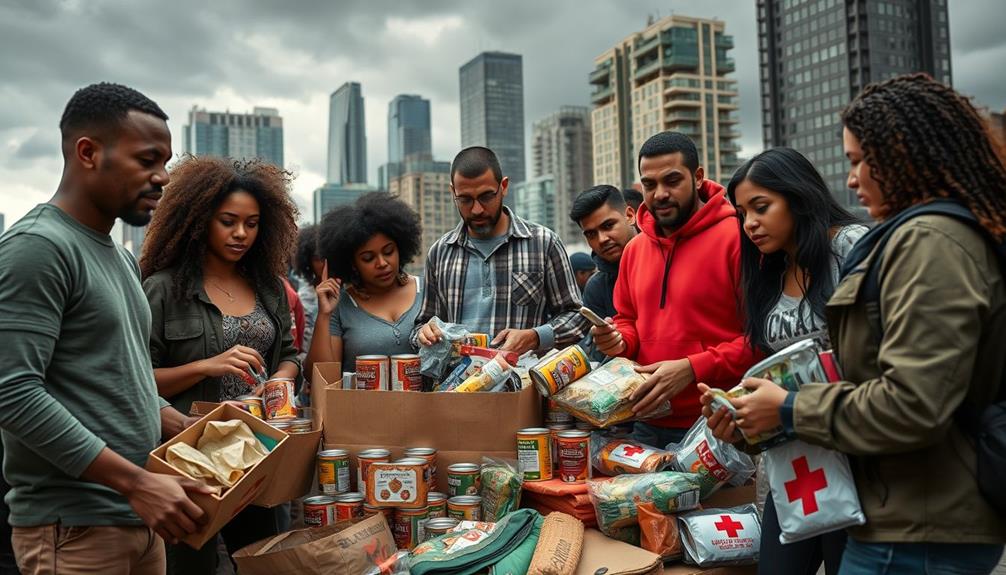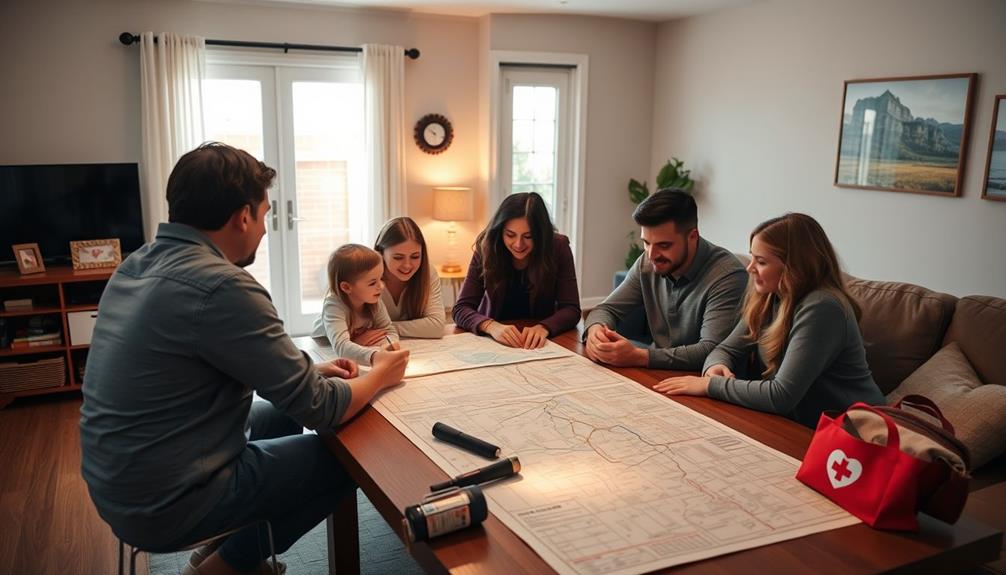Embracing Mindful Zen for emergency preparedness helps you face chaos with calmness and clarity. By practicing mindfulness, you'll improve your focus and resilience, making it easier to adapt in stressful situations. Simple techniques like deep breathing and meditation can stabilize your emotions and sharpen your decision-making skills. Incorporating intentional actions, such as nature walks and journaling, deepens your awareness of your environment. This holistic approach not only readies you for the unexpected but fosters overall well-being. If you want to explore practical ways to implement these strategies, there's much more to discover.
Key Takeaways
- Integrate breathing exercises into your prep routine to enhance focus and calmness during emergencies.
- Practice regular meditation to improve decision-making skills and emotional stability in chaotic situations.
- Engage in nature walks to reduce stress and foster a deeper connection with your environment.
- Utilize journaling for reflection, helping to clarify thoughts and emotions amidst uncertainty.
- Conduct preparedness drills with mindfulness to reinforce resilience and maintain a survival mindset.
Understanding Prepper Zen

What does it mean to embrace Prepper Zen? It means blending mindfulness with preparedness, allowing you to stay present and calm, even in chaotic situations.
You focus on living in the moment, fostering a sense of clarity and resilience. By understanding Prepper Zen, you cultivate an awareness that helps you connect deeply with your surroundings.
This approach encourages intentional actions and simple living, which can transform how you handle uncertainty. Rather than getting lost in worries about the future, you learn to appreciate the here and now.
Embracing Prepper Zen equips you with mental tools necessary for effective decision-making, ultimately leading to a more balanced and proactive mindset in emergency scenarios.
Benefits of Mindfulness in Emergency Situations

Mindfulness acts like a steady anchor during emergency situations, providing essential benefits that can greatly enhance your response.
By staying present, you improve your focus and clarity, enabling better decision-making under pressure. This heightened awareness reduces anxiety and stress, allowing you to maintain composure when it matters most.
As you cultivate resilience, you become more adaptable to changing circumstances, ensuring you can handle unexpected challenges with ease.
Mindfulness also enhances your emotional stability, helping you remain calm amidst chaos.
By practicing mindfulness regularly, you'll develop a proactive mindset, empowering you to take intentional actions rather than reacting impulsively.
Ultimately, embracing mindfulness not only supports your preparedness but also fosters a balanced lifestyle, promoting overall well-being during emergencies.
Essential Mindfulness Techniques

Practicing essential mindfulness techniques can greatly enhance your preparedness for emergencies.
Start with breathing exercises to calm your mind and body; simply focus on your breath, inhaling deeply and exhaling slowly. Incorporate meditation sessions into your routine to develop concentration and awareness, allowing you to remain focused under pressure.
Journaling helps you reflect on your thoughts and emotions, providing clarity in chaotic situations. Nature walks can connect you to your environment, reducing stress while sharpening your senses.
Finally, use visualization techniques to mentally prepare for potential scenarios, reinforcing a proactive mindset.
Mindfulness Practices for Preppers

Integrating mindfulness techniques into your prepping routine can greatly enhance your ability to handle emergencies. Start with breathing exercises to center yourself and calm your mind.
Incorporate the Body Scan technique to identify stress levels, helping you manage anxiety effectively. Regular meditation sessions improve concentration, sharpening your decision-making skills under pressure.
Engaging in nature walks allows you to connect with your environment, fostering awareness and reducing stress. Visualize potential scenarios to mentally prepare for challenges ahead.
Additionally, conduct drills while focusing on maintaining calmness, reinforcing your survival mindset.
Incorporating Mindfulness Into Daily Life

While you navigate the demands of daily life, incorporating mindfulness can transform your routine into a more centered and intentional experience.
Start by dedicating a few minutes each day to breathe deeply, allowing yourself to be present. As you go about your tasks, try to focus fully on each activity, whether it's eating, walking, or talking. This helps you appreciate the moment and reduces distractions.
Journaling can also be beneficial; jot down your thoughts and feelings to gain clarity. Engage in nature walks, immersing yourself in your surroundings to relieve stress.
Resources for Mindful Preparedness

Mindful preparedness hinges on having the right resources at your fingertips. Start by exploring books that blend mindfulness with survival techniques; they can deepen your understanding and practice.
Online courses focusing on mental resilience and emergency preparedness are valuable, providing structured learning at your pace.
Don't forget to download meditation and mindfulness apps; they offer guided sessions to fit into your busy life.
Seek out local workshops or groups dedicated to prepping and mindfulness, as they foster community and support.
Ultimately, tune into podcasts that discuss the intersection of mindfulness and survivalism; they're a great way to learn while on the go.
Embrace these resources to enhance your mindful preparedness journey!
Building a Mindful Community

Creating a mindful community starts with fostering connections among individuals who share a commitment to preparedness and mindfulness.
You'll want to engage with local groups or forums that emphasize these values. Organizing regular meet-ups or workshops can help individuals practice mindfulness techniques together, strengthening bonds and building trust.
Encourage open discussions about personal experiences and strategies for preparedness, allowing everyone to learn from one another. Consider forming smaller accountability groups to keep each other motivated and focused.
By sharing resources and knowledge, you enhance everyone's skills and resilience. Remember, a mindful community thrives on support, understanding, and collective growth, empowering each member to navigate uncertainties with confidence and clarity.
Embrace this journey together, and watch your community flourish.
Frequently Asked Questions
How Can Mindfulness Improve My Daily Routine Outside of Prepping?
Mindfulness can transform your daily routine by enhancing focus, reducing stress, and fostering emotional stability. You'll notice greater awareness in your actions, improved decision-making, and an overall sense of peace in your life.
What Are Common Misconceptions About Mindfulness and Prepping?
Mindfulness isn't just a tranquil lake; it's also a sturdy bridge. Many think it's passive, but it actively sharpens your focus, enhances decision-making, and fosters resilience—essential elements for steering through both everyday challenges and emergencies effectively.
Can Mindfulness Be Practiced in Group Settings?
You can practice mindfulness in group settings. Engaging in shared meditation, group discussions, or mindfulness exercises fosters connection, enhances emotional support, and creates a collective atmosphere that nurtures awareness and resilience among participants.
How Long Should I Practice Mindfulness Each Day?
Wondering how long to practice mindfulness each day? Aim for at least ten to fifteen minutes. This brief commitment can profoundly enhance your mental clarity, reduce stress, and foster a deeper connection with your surroundings.
What if I Struggle to Stay Focused During Mindfulness Exercises?
If you struggle to stay focused during mindfulness exercises, try starting with shorter sessions. Gradually increase your practice time, use guided meditations, and remember, it's okay to acknowledge distractions without judgment. Keep practicing!
Conclusion
By embracing Mindful Zen in your emergency preparedness, you not only equip yourself with practical tools but also cultivate a calm, resilient mindset. Imagine facing a crisis with clarity and confidence—wouldn't that make all the difference? As you integrate mindfulness into your daily routine, you'll find that being prepared goes beyond supplies; it's about nurturing your mental and emotional well-being. Start your journey today, and transform your approach to uncertainty into one of strength and serenity. Don’t just focus on stocking up on emergency gas containers or other physical supplies, but also on building your inner resources. Mindful Zen in emergency preparedness means developing the ability to stay present and calm when faced with unexpected challenges. It’s about learning to respond with clarity and grace, rather than reacting out of fear or panic. By prioritizing your mental and emotional well-being in addition to physical preparedness, you’ll be better equipped to handle whatever comes your way.










